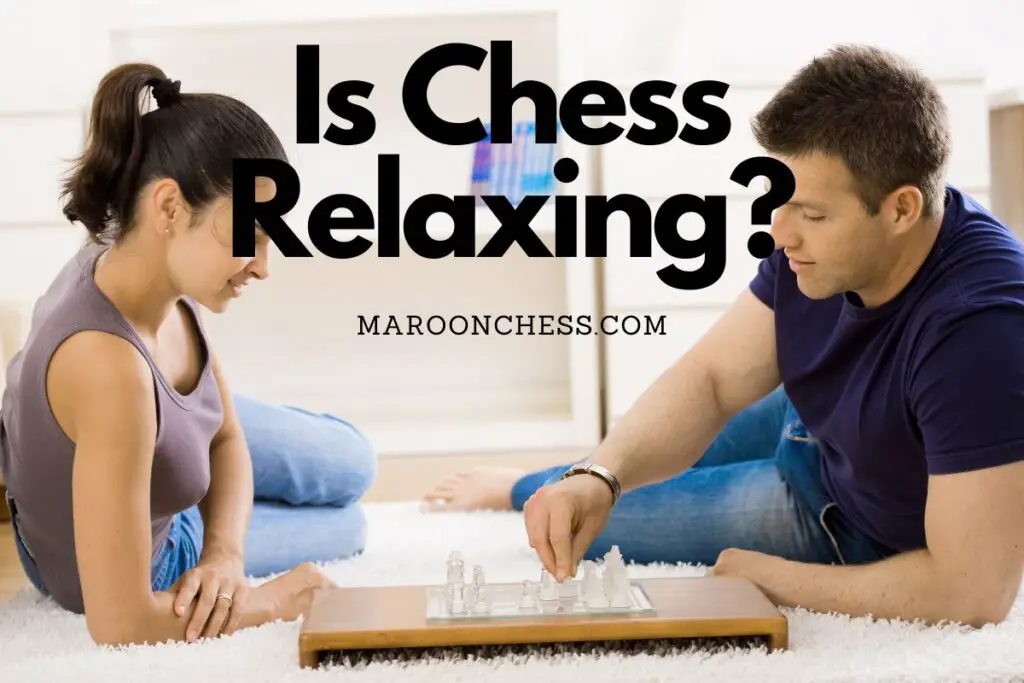Chess is a centuries-old game that has captivated millions of people around the world. While it’s often associated with competition and intense mental challenges, one question that arises is whether chess can be a source of relaxation.
Can the act of moving pieces on a board and outwitting opponents with calculated moves actually help calm the mind and promote relaxation?
In this article, we will explore the topic and delve into the question: Is chess relaxing? We’ll examine various perspectives, consider the potential benefits of chess for relaxation, and shed light on how this ancient game can impact one’s mental state.
Whether you’re an avid chess player or simply curious about its potential relaxing effects, join us on this journey to unravel the mystery of whether chess can be a soothing and tranquil activity.
The experience of whether chess is relaxing can vary greatly from person to person. For some people, chess can be a calming and enjoyable activity that helps them relax and unwind.
The strategic nature of the game, the need for concentration and focus, and the intellectual challenge it presents can be mentally stimulating and provide a sense of satisfaction and relaxation.
Chess can also be a solitary activity that allows for quiet contemplation and reflection, which can be soothing for some individuals. Playing chess can be a form of mindfulness, where players are fully engaged in the present moment, absorbed in the game, and not thinking about other stresses or worries.
On the other hand, for some people, chess can be mentally taxing and stressful, especially during competitive games or when facing challenging opponents.
The pressure to make the right moves, the need to plan ahead and anticipate opponent’s moves, and the time constraints of the game can create tension and anxiety, which may not be relaxing for everyone.
Ultimately, whether chess is relaxing or not depends on the individual’s personal preferences, skills, and mindset. Some people find it relaxing, while others may not. It’s important to consider your own personality, interests, and stress levels when determining if chess is a relaxing activity for you.
6 Reasons Why Chess Is Relaxing
Mental Stimulation
Chess requires deep concentration, critical thinking, and strategic planning. Engaging in such mental exercises can help calm the mind by redirecting focus away from stressors and promoting a state of flow, where one is fully absorbed in the game.
Mindfulness
Playing chess can be a form of mindfulness, where players are fully present in the moment, paying attention to the board, the pieces, and the moves they are making. This mindfulness can help to quiet the mind, reduce racing thoughts, and promote relaxation.
Sense of Control
Chess provides players with a sense of control, as they have the ability to make decisions and choices that directly impact the outcome of the game. This sense of agency can foster a feeling of empowerment and relaxation, as players can feel more in control of the situation.
Emotional Regulation
Chess can help develop emotional regulation skills, as players learn to manage their emotions, such as frustration, disappointment, and excitement, during the game. This emotional regulation can carry over into other areas of life, promoting relaxation and emotional well-being.
Solo Activity
Chess can be played alone, allowing for quiet solitude and introspection. This can provide an opportunity for self-reflection, relaxation, and a break from social interactions or external stressors.
Enjoyable Challenge
For many players, the challenge of chess is enjoyable and fulfilling. Engaging in a mentally stimulating activity that requires strategic planning, problem-solving, and creativity can provide a sense of satisfaction and accomplishment, which can be relaxing and rewarding.
How Chess Can Be Infuriating?
Along with the thrill of the game, chess can also be incredibly infuriating at times.
The feeling of making mistakes, facing unexpected setbacks, or dealing with the pressure of time constraints can lead to frustration and disappointment.
Here are 6 reasons why chess is not relaxing:
Complex Rules
Chess has a steep learning curve, with intricate rules governing how each piece moves and interacts on the board. This complexity can be frustrating for beginners or casual players who may struggle to grasp the rules fully, leading to mistakes and errors.
Strategic Mistakes
Chess is a game of strategy, and a single miscalculated move can have a domino effect, leading to unfavorable consequences.
Making strategic mistakes or overlooking opponent’s moves can be infuriating, especially when it results in losing a valuable piece or a significant advantage in the game.
Time Pressure
Chess is often played with time constraints, where players need to make their moves within a set time limit. This can add pressure and stress, leading to rushed decisions, overlooked moves, and frustration, particularly when time is running out.
Unpredictable Opponents
Chess is a two-player game, and the moves of the opponent are not always predictable. Facing a skilled or unpredictable opponent who thwarts your plans or surprises you with unexpected moves can be frustrating, leading to a sense of helplessness or disappointment.
Long Games
Chess games can be lengthy, especially in competitive settings or when playing against opponents who take their time to think through each move.
Enduring a prolonged game that may require hours of concentration and mental effort can be mentally taxing and frustrating, particularly when progress is slow or uncertain.
Emotional Investment
Chess can be emotionally charged, as players invest time, effort, and strategic thinking into the game. The emotional investment can make losses or mistakes feel more personal and aggravating, leading to frustration or disappointment.
Final Thoughts
While chess can be an enjoyable and intellectually stimulating game, it can also be frustrating for some players, especially when facing challenges or setbacks.
Each person’s experience with chess may vary, and some individuals may find certain aspects of the game infuriating, while others may not.


